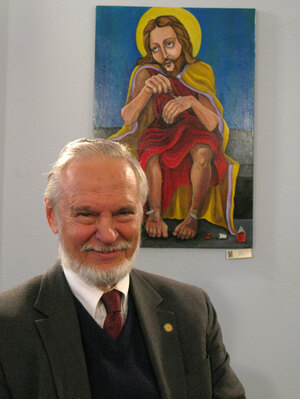 Michael Ignatieff in a very familiar situation
Michael Ignatieff in a very familiar situationWriting in an op/ed column in the Globe and Mail, Tom Flanagan recounts the recent trials and tribulations of Liberal leader Michael Ignatieff, and casts them in an interesting -- and familiar -- light:
"The leader of the opposition, after supporting the minority government's budget, decides that he would like to force an election after all. He publicly announces his intention to defeat the government, leaving the Prime Minister lots of time to react. Then the roof caves in at Stornoway.As Flanagan notes, this certainly describes Michael Ignatieff's experience since September. But it also describes the experience of Prime Minister Stephen Harper in 2005, back when he was occupying Ignatieff's current office.
The government whips up a storm of public opposition to an election, telling people that they will lose benefits that were in the budget but have not yet passed through Parliament. Helping the government to survive, Jack Layton offers crucial support in return for policy concessions that will please NDP supporters. At a major turning point, the unity of the opposition is threatened as the leader loses the support of a key member of the caucus.
Public reaction is savage. People say they don't want an election, and the opposition falls to rock-bottom standing in the polls while the government soars. Pundits indulge in a feeding frenzy over the badly wounded body of the opposition leader. They deride his strategy. They demand that he reveal the platform he will run on in the next election campaign. They speculate that his political career is over. In response, the leader replaces his chief of staff and contemplates further changes in his retinue."
"After initially supporting Paul Martin's budget, Mr Harper decided to defeat the government when embarrassing revelations started to trickle out from the Gomery inquiry into the Liberal sponsorship scandal.Of course, there are many differences afoot. The Gomery Inquiry was already underway when Harper made his intentions to defeat the Martin government clear. Canadians already knew that an embarrassment of riches had been stolen by the Liberal party under the guise of the Sponsorship Program.
Then everything happened as just described. The government mobilized public opinion against an election, the NDP changed sides, Belinda Stronach defected to the Liberals, Conservative poll numbers nosedived, Mr Harper was savaged in the media and he reorganized his office."
What we didn't yet know was the brazen flagrance with which the scandal was perpetrated.
Recently, the Liberal party has been making a lot of noise about a disproportionate amount of stimulus funds being spend on projects in their ridings. When asked to disclose precisely where money was being spent, and one what projects, the Tories decided to bury Parliamentary Budget Officer Kevin Page with virtually every document related to the matter.
But there are numerous other factors involved in the matter, including the requirements of regional parity, as well as an alleged disproportionate number of project applications from municipalities within Conservative-held ridings.
It seems highly unlikely that an adscam-level scandal is going to emerge to rescue Ignatieff from his current circumstance.
Still, Flanagan has in his hands the power to improve his party's circumstances, and put it in a position where it can compete with the Conservative party for the privilege to govern the country.
Flanagan describes the steps Ignatieff needs to take very simply:
First, study what Harper did to turn his fortunes around. (Unshockingly, Flanagan suggests some of his own work.) Second, when moving to defeat the government, move quickly. Third, have a reason to defeat the government. Have a pretext.
Many Canadians were confused about Ignatieff's eagerness to defeat the government. It seemed very sudden, and Ignatieff seemed to lack an issue underiding the move other than Harper's time allegedly being "up".
The recent move to recruit Peter Donolo back into the Liberal leader's office suggests that Ignatieff may be following a similar game plan to Harper's. But, as Flanagan notes, it won't be enough on its own:
"Mr Ignatieff has messed up big-time, but the outlook doesn't have to be entirely bleak. Since he has been imitating Mr Harper so closely, he can take solace from the fact that the Conservative leader bounced back, winning the next election and becoming prime minister less than a year after his time of troubles in spring 2005.Of course, there is one potential weakness in Flanagan's advice to Ignatieff.
Replacing a chief of staff won't solve anything (in politics, the person who is fired is seldom to blame for what went wrong), but it can be an occasion for starting over.
The key is self-interrogation. Someone who wants the ultimate prize of becoming PM has to accept responsibility for all the things that go wrong along the way and figure out how not to repeat those errors (while realizing he will inevitably make others). That's the most important lesson of Mr. Harper's annus horribilis of 2005: that a leader can rebound from disaster to triumph if he accepts responsibility for his mistakes and learns to avoid them in the future."
In following Flanagan's advice, Ignatieff would be trying to emulate the Stephen Harper of 2005. But if the Prime Minister has shown anything over the past three years, it's that Harper has a repertoire packed full of politically savvy maneuvers.
Michael Ignatieff can't fully expect to be able to use Stephen Harper's playbook from 2005 to be able to beat the Harper of today. When Ignatieff's time to move against Harper finally comes, he'd better be able to have a play of his own to call.















